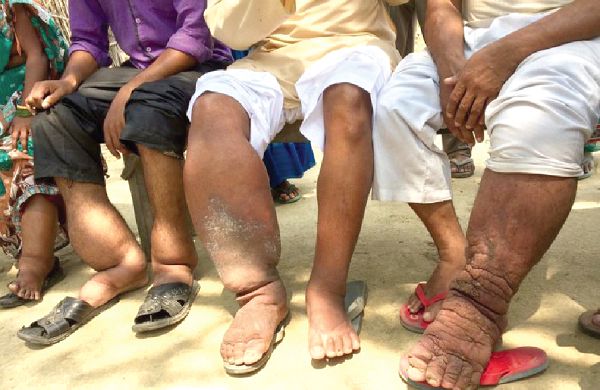The Upper East region of Ghana has recorded the highest number of cases of elephantiasis, also known as lymphatic filariasis, in the country.
According to the Ghana Health Service, there have been 2,373 confirmed cases of elephantiasis in the region, accounting for about a third of the total national cases.
Elephantiasis is a parasitic infection caused by thread-like worms transmitted through the bites of infected mosquitoes.
The infection can lead to swelling and thickening of the limbs and genitals, resulting in significant disfigurement and disability and can also cause severe pain and discomfort, as well as secondary infections.
Bright Alomatu, Desk Officer, Neglected Tropical Diseases (NTDs) programme of the Ghana Health Service said even though all 15 municipalities and districts of the Upper East Region are endemic, health workers have been able to stop the spread of elephantiasis in the region.
The Upper East region’s high number of cases, Mr. Alomatu said, could be due to several factors, including poor sanitation and hygiene practices, a condition that create a conducive environment for mosquitoes to breed and spread the infection.
“The risk is very high where we have transmission ongoing because the mosquitoes bite everybody. So once the parasite is in the system and the mosquitoes are picking and spreading, then the likelihood of you getting it is very high.”
He was speaking during a stakeholder’s sensitization held in Bolgatanga on measures to adopt and advocate to address concerns confronting patients of the disease.
According to Mr. Alomatu, health workers and volunteers were also trained since 2016 across all regions of the country, and that had contributed to stopping the transmission of the disease in 109 districts.
He said the disease was mapped in 1999 and out of the 261 districts across the country, 116 were identified as endemic of elephantiasis with only regions such as Ashanti, Ahafo, Volta, and Oti regions being non-endemic.
“We’ve trained 2,100 patients on how to manage their conditions so that they can see an improvement of the condition of the leg or whichever that is swollen so that it will not swell further and they will not also be going through acute inflammation”, he added.
He mentioned areas such as the legs, hands, breasts of women, penis, vulva, and scrotum as parts mostly affected by the condition with the commonness in Ghana being the hands, legs, and scrotum.
The sensitization was organized with support from the Ghana Health Service, American Leprosy Mission, and the Christian Connection for International Health.
Mr Solomon Atinbire, Programme Manager for American Leprosy Mission said the rationale for organizing the sensitization was to equip some individuals to serve as game changers to advocate for the inclusion of patients with elephantiasis cases in Ghana’s Livelihood Empowerment Against Poverty (LEAP) programme.
“That would help them [patients] to get some monies to register for health insurance coverage so that anytime they are taken ill, they can visit the health facilities for care”, he stated.
Mr. Atinbire explained that the condition of elephantiasis made the patients vulnerable to engage in any economic activities or access health services, hence the decision to form a committee in all districts and municipalities of the region to advocate for the welfare of the patients with elephantiasis.
Dr. Josephat Nyuzaghl, the Upper East Regional Deputy Health Director in charge of Public Health said it is expected that the advocacy groups would engage the assemblies for the patients to benefit from some of the disability funds of the assemblies.
Latest Stories
-
Bayern midfielder Palhinha joins Spurs on loan
3 hours -
I went to games knowing we would struggle – Amorim
4 hours -
Chelsea sign Ajax defender Hato for £37m
4 hours -
‘God understands us’: Inside a Nigerian church where deaf people find faith and community
4 hours -
ARCC maintains military at Tontokrom pending resolution of mining concession dispute
4 hours -
T-bills auction: Government records 75% oversubscription, interest rates decline further
4 hours -
Cedi’s recent gains will hold through 2025, 2026, but gold prices decline is a threat – Fitch Solutions
4 hours -
Armah-Kofi Buah Launches 2025 NkrumahFest to Honour Ghana’s First President
4 hours -
Photos: Vigil night for Daddy Lumba at Black Star Square
5 hours -
Disclaimer & Clarification: Setting the record straight on my comments during the 2025 Mid-Year Budget Debate
5 hours -
Gunman shoots 10 during fire outbreak at Madina Ritz Junction
5 hours -
Sunyani mourns Daddy Lumba
6 hours -
Foundation empowers over 6000 women with vocational training and startups kits
6 hours -
“Legal and social interventions on Adom-Otchere’s behalf were towards revising harsh bail conditions only“
6 hours -
CMCE, ActionAid-Ghana Empower Students in Ahafo with climate resilience knowledge
6 hours

